
The First Colorado Cycling Summit
Cycling Season is here, and so is a long list of epic rides throughout the state and surrounding states. Are you ready? Join Avid Cyclist, and other co-hosts for the
By Kate Agathon …..
At 61, Greg Bachman had spent the last several decades of his life riding wherever his sense of exploration took him.
From organized gravel and mountain biking events to solo multi-day bikepacking tours or adventures with his beloved wife of 22 years, Crystal Miller, Bachman loved indulging in the freedom that two wheels gave him.
According to his wife, Bachman was a man who “loved to ride anywhere” and enjoyed riding long distances that required thinking and planning. A member of the Rocky Mountain Cycling Club, he enjoyed self-paced rides and logged anywhere from 3,000 to 6,000 miles a year.
A high school science and math teacher, the Frisco, Colorado resident had everything it took to be a successful ultra endurance cyclist.
The combination of natural talent, boundless energy, precision, caution, and adventure had led Bachman and his bike across vast expanses of wilderness that included soaring mountains, endless grasslands, and searing desert.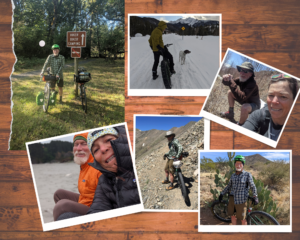
Precise, planned, and analytical, Bachman was a man who was always curious of what a human body could do. Friends described the natural explorer as “…The OG of bikepacking and long distance riding.”
Pedaling his bike for long distances was a release for him and also allowed him to utilize his extraordinary analytical mind, which Miller says made him “so special and unique.”
“Greg loved to ride, loved to pedal and loved to be out there. Before there were books and guides for rides like the Colorado Trail, he was out there just kind of mapping it out and doing it; often doing things people hadn’t really thought of before,” said Miller.
“It didn’t matter to him what everyone else did, he just did what made more sense to him because he was so very logical,” she continued.
For example, when he rode the 2,745 mile Tour Divide route, he chose to ride it from south to north, because it made more sense to him to begin in Mexico first when it wasn’t super hot, and then 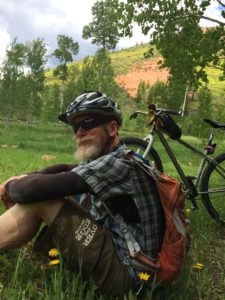 progress north to Canada as the snow melted away.
progress north to Canada as the snow melted away.
Bachman was also a veteran of many Life Time events, including the Leadville Trail 100 MTB, and UNBOUND Gravel races. He enjoyed the physical and mental challenge it took to participate not only against some of the best riders in the world, but also against himself.
And in 2022, he had unfinished business to complete.
A decade earlier, Bachman had competed in the Leadville Challenge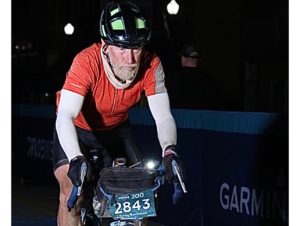 that consisted of a series of endurance running and cycling events. Unfortunately, while doing the 100 mile mountain bike ride on a single speed rigid bike with no shock, he had opened up a tiny hernia and was unable to finish the subsequent 100 mile trail run.
that consisted of a series of endurance running and cycling events. Unfortunately, while doing the 100 mile mountain bike ride on a single speed rigid bike with no shock, he had opened up a tiny hernia and was unable to finish the subsequent 100 mile trail run.
When he turned 60, he informed his wife that he was going to return to Leadville and complete the Lead Challenge in its entirety. However, before the final push for the Lead Challenge, they planned to ride the upcoming UNBOUND Gravel race together to kick off the summer cycling season in June.
Dubbed “the world series of gravel”, UNBOUND Gravel is one of the largest gravel races in the world. In 2022, 4,000 cyclists representing 50 states and 44 countries were registered to participate. Among them were Bachman and Miller.
Bachman had a long history of riding UNBOUND Gravel (formerly Dirty Kanza) solo, so he was excited that his wife would accompany him to the event in Emporia, Kansas that summer. He planned to ride the traditional 200 mile stretch, while she opted for the 100 mile distance.
Unfortunately, the opportunity to experience riding UNBOUND Gravel together would not materialize.
Bachman was struck and killed by a large pickup truck whose driver failed to yield at a four-way intersection where he and his wife were doing a warm up ride on the eve of UNBOUND Gravel on June 3, 2022.
No Justice in Kansas
From the onset, there was no chance for justice.
The driver of the 2021 Chevy Silverado pickup truck that killed Bachman was Emporia resident Cory Smith, 52. Although Smith did not intend to cause the crash, he was not cited for his role.
The Kansas Highway Patrol (KHP) and other agencies involved not only failed to do a thorough investigation, but suggested that Bachman was at fault in the crash report narrative and subsequent interviews.
When local media reported on Bachman’s death, the collision details provided were scant and the KHP’s biased rhetoric that suggested that Bachman was at fault was continued. For example, as reported by KVOE radio:
“Kansas State Police have only released the following statement: Just after 5 PM on Friday, near the intersection of Lyon Co. Rd. 190 and F., Gregory Bachman, 61, of Frisco Co., was headed northbound on Road F and entered the intersection when he was struck by a truck.”
To insinuate that a cautious and experienced cyclist as Bachman was someone who would heedlessly ride into an intersection without awareness of his surroundings or not following the rules of the road was insulting.
Furthermore, The Emporia Gazette released a follow up to its initial article underscoring the community’s pervading anti-cyclist bias during an interview with one of the KHP troopers.
The KHP trooper indicated that no criminal charges would be pursued, because “Vehicle One (Bachman) entered the intersection and struck Vehicle Two (Cory Smith’s pickup). If Vehicle One is listed, that’s usually the person who is at fault. Who are you going to write the ticket to?”
At minimum, the article was devoid of compassion, portraying Bachman as a vehicle and not a human being. At most, it failed to present the complexity of the case, revealed bias, and exposed the lack of hard work required for a fatality investigation.
“Greg was in the intersection first, where he was impacted in the front of the pickup truck. He did not hit the pickup truck; there was no side impact. To say that Greg hit a pickup truck… how does somebody hit the front of a pickup truck?” Miller asked angrily.
To Miller and Bachman’s friends, it was a great dishonor to his memory that Bachman was being portrayed as an irresponsible cyclist.
“Greg being the cyclist person he was, was the safest person to ride with. He was super safe! He never wore headphones, always obeyed every signal, always wore a helmet. He never deviated from his safe routines while he was out riding, and he avoided riding with people who did not follow the rules,” his wife said.
In order to fully understand the injustice surrounding Bachman’s death, it is important to examine several factors.
First, how seeking the right legal help illuminated how inappropriately the crash was initially investigated and later portrayed. Secondly, the appalling treatment of his wife immediately following the crash, and third, the danger of anti-cycling bias.
Seeking the Best Legal Advice
The investigation was both incomplete and insufficient.
The crash report contradicted what Miller had witnessed and questioned Bachman’s character and history as a cautious cyclist, which did not sit well with her.
Even after she had returned home to Colorado, she had the lingering suspicion that the investigation was improperly done. To uncover the truth, she needed to find the right legal help.
She first met with probate attorney Anthony “Tony” Mello to discuss the estate.
An attorney in the small mountain community of Breckenridge, Mello was the type of individual whose genuine concern for his clients outweighed any financial gain (he had once had a client who basically paid her legal bills in food because she could not afford him after her husband died). An empathetic man, he truly cared about those in the community he served and was also known to make house calls and even shovel the driveways of clients.
After reviewing Miller’s case, Mello immediately realized that the crash report was suspicious. Most apparent to Mellow was that a fatality had occurred and the subsequent investigation didn’t seem cohesive. Why was Bachman being blamed for the crash? Why was the driver of the pickup not cited? Something didn’t add up.
Realizing that additional legal expertise was needed, he called upon bicycle accident attorney Brian Weiss, for his professional opinion. Mello was familiar with Weiss because he had successfully represented some other clients in a crash that was complicated and involved serious injuries.
More importantly, Mello trusted his legal expertise. He knew that the Denver-based Weiss had over 28 years of experience protecting the rights of cyclists, and would take into account factors and dynamics in bike crashes that others -especially law enforcement- would miss.
“Tony said to me, ‘Something doesn’t smell right here. We think the police home cooked Greg’s case to help the local guy out.’ I explained to him that a lot of times there’s the anti-cyclist bias that enters into the police officer’s mind, they form an initial opinion and come up with a supporting conclusion. I was definitely intrigued and wanted to find out what happened,” explained Weiss.
Interestingly, prior to Mello reaching out, Weiss had heard of Bachman’s death a few days prior while out on a bike ride in Breckenridge with friends. The Colorado cycling community is small, and having a much-loved local teacher die the day before UNBOUND Gravel was big news in Summit County.
Weiss later met up with Miller at a restaurant in Breckenridge, where they sat on a deck and reviewed what happened and what she knew.
“Obviously, I was very sympathetic to Crystal after having lost her husband. Being a cyclist myself, I could understand the trauma that she was suffering after seeing her husband die basically right in front of her,” said Weiss.
“I was intrigued on how this crash really happened. I had the basic crash report, but it didn’t seem to add up. It was like an onion, where you keep pulling back layer after layer after layer,” he continued.
Although the crash was investigated by both KHP and the local Emporia police, evidence by the two agencies was inexplicably kept separate.
According to Weiss, the Emporia police had interviewed witnesses and had taken photos. However, the collected statements and photos were not included with those of the KHP’s.
Additionally, only one person from the KHP completed the entire investigation himself. That in itself was bizarre.
Weiss explained, “In Colorado and other states, when there is a traffic death fatality, there’s a much more extensive investigation with usually a team of at least three people and a lot more data collection and analysis,”
“In Emporia, there was very little analysis, but basically a situation where you have a dead person and a local resident. Here, the local resident was given the benefit of the doubt,” he continued.
Weiss analyzed data and hired an engineer to reconstruct the crash scene. And what the engineer discovered confirmed the suspicions of Miller and her legal team.
Investigative Inadequacies
While the crash report showed how little investigation was done and revealed how readily the KHP were prepared to place the blame on Bachman, the accident reconstruction revealed several oddities.
Let’s begin with the crash report.
The KHP’s crash narrative reveals bias toward cyclists, by stating that Bachman entered the intersection for an “unknown reason” and struck the pickup truck.
If Bachman had hit the pickup truck, he would not have been carried 90 degrees off course from where he was heading. He would have been stopped at the intersection.
What really happened was that Bachman was struck by the front of the pickup truck and dragged several feet as shown by photographs of the front of the truck and the marks in the dirt.
This was also corroborated in a statement provided by Miller who told a different story from that of the KHP. In it, she mentions a “…white truck traveling down the hill at a very high rate of speed, when Bachman was struck by the front of the truck and dragged several feet.”
Unlike the KHP who basically accepted the driver’s explanation, Weiss relied upon physical evidence to demonstrate who was responsible for the fatal crash.
Weiss said, “There was a disconnect in the physical evidence and the investigating officer’s conclusion. I started with the understanding that the physical evidence (i.e. skid marks on a dirt road, area of impact and property damage to the pickup truck and bicycle, etc.) should control the direction of the investigation.”
“However, the officer had to skip over all of that, including the fact that Greg was already about 80 percent across the intersection and going much slower than the truck driver when the impact happened. We call that the ‘Delta V’, or change in velocity, and here it shows who can avoid the crash,” he continued.
And who was the person who could have avoided the crash? Smith.
Next, Weiss maintained that it was clear that the physical damage was to the front of the pickup truck. This evidenced that Smith was making an avoidance move to the right, albeit too late.
In short, physics demonstrated that Smith was responsible for causing the crash, not Bachman.
“Overall, a fatal crash like this does not happen when everyone is careful and alert, so it was more likely than not the inattentive truck driver (who was going much faster than the cyclist) had the last clear chance to avoid the crash,” he continued.
Only after Weiss had completed the data calculations and had a solid understanding of Kansas law for unmarked intersections (who has the right of way, speed limits on unmarked roads, etc.), could he consult with an engineer and begin the crash reconstruction.
More Obstacles
Reconstructing the crash and putting the clues together was unnecessarily laborious because it was marked by obstacles- the biggest of which was the KHP report being adverse to Miller and their refusal to provide an explanation as to why Bachman was in the intersection or why he was on the road.
“Of course Greg had the absolute right to use that road. It is a public road, and the area is very similar to what was on the race course. But since it wasn’t on the race course, there weren’t any markings and there wasn’t any notice to drivers that bicyclists would be out there riding,” Weiss stated.
Under the civil standard, Weiss attacked the KHP investigation to probe what was more likely right, or more likely to have happened.
It was apparent to Weiss that he could show more than likely that Bachman was at the intersection first, and that point needed to be made. But, making that point turned into a frustrating process, characterized by more hindrances.
It took a long time to get the full data from the police, and to collect all the witness statements and photographs from two different agencies. The gathering of data alone basically took more than two months. Then, Weiss had to methodically piece it all together.
“I felt from the reconstruction that I was doing that Greg was definitely in the intersection at least 1 to 2 seconds before the pickup truck was in the intersection. Consequently, the pickup truck should have been able to see Greg. And then, when I got the statements of all the witnesses including the driver, it was made clear to me that the driver saw Crystal, but did not see Greg for some reason,” Weiss maintained.
In Weiss’ summary, one of the biggest missteps in the KHP crash report was the timing.
Specifically, when someone is in the intersection first, the other driver coming from the other direction must yield right-of-way when there are no stop signs or traffic signals present.
According to Weiss, the KHP actually did take measurements that showed that Bachman was in the intersection first. However, because Bachman was already dead and to demonstrate support of a local resident, KHP took the path of least resistance by taking the word of a local over physics. This was the “home cooking” that probate attorney Mello had alluded to.
“It seemed like the officer in his head thought,‘Why should this crying and sympathetic local guy suffer, when I could put the blame on the cyclist who at this point is already dead and didn’t even have any medical bills?’ That was the false assumption that led to even more stress on Miller since KHP didn’t seem to take this case very seriously and just wanted to close the matter,” Weiss stated.
While Bachman’s GPS computer was destroyed in the crash, Miller’s Garmin was intact.
Data from his wife’s GPS was used as part of the crash reconstruction. Her Garmin file showed the speed that the couple were going, route, and elevation and put it all on a map.
In order to piece the crash together, Weiss utilized her Garmin’s data to examine the time and spacing of where the crash happened, and to review the speeds of the cyclists and the pickup truck. His findings contradicted the local narrative that Bachman was at fault.
Through the incredibly detailed crash reconstruction that Weiss compiled, it was further revealed that law enforcement failed to perform the level of thorough detail that is normally expected in a fatality investigation.
The mishandled investigation was marked by other oddities:
The KHP’s indifference was revealed by their hesitancy to perform an investigation that would require them to review all the evidence and do additional paperwork.
Additionally, because no charges were filed, the Lyon County district attorney did not get involved. No witnesses (i.e. Miller) were interviewed, nor did the district attorney look into the full accident reconstruction or measurements that were made available to form a final opinion and submit charges.
“What happened in Kansas…I’ll never return there. Never. Early on, I had a nightmare where I was on my hands and knees and I had cut Kansas out of the United States. What they did there and how they acted was unbelievable!” exclaimed Miller.
Most infuriating to his wife was that even after the crash reconstruction was sent to the KHP showing that Smith was responsible, no acknowledgement or follow up was ever done. No promises were made to correct the anti-cyclist bias of its troopers. Just radio silence.
Law Enforcement Bias
“There are plenty of cases where police have gotten the basic facts of a crash wrong; I see approximately 20-30 cases of these mistakes each year,” said Weiss.
“Many are because all the facts and witnesses are not included in the report. Many reports are completed without even getting the cyclist’s side of what happened because they are getting medical care or are unable to tell the police what happened due to a loss of consciousness, or worse when there is a fatality,” he specified.
For example, one client of his was riding his bike to a friend’s house in Denver when he was struck by a car. The police cited the cyclist for riding on a sidewalk and then coming off of the sidewalk immediately in front of the car (in Denver it is illegal to ride a bicycle on a sidewalk).
While the cyclist was still alive and able to talk to the police (albeit not in any coherence), Weiss reviewed the route the cyclist took.
Based on camera footage from a local grocery store and Google maps, Weiss realized that the cyclist was never riding on the sidewalk. Instead, he was biking on the road when the car was coming from another direction, failed to stop, and struck the cyclist.
Weiss also pointed out that the cyclist was “…Never really interviewed by the police because a lot of time you’re in the hospital and you’re in a lot of pain and the police officers in Denver are very behind so they just want to complete their investigation and move on.”
Police blamed the cyclist and falsely accused him of riding on the sidewalk, when the evidence demonstrated that what unfolded was exactly the opposite of what was described in the crash report.
National Trend
Law enforcement bias towards cyclists is unfortunately not unheard of. As recently as 2021, a particularly damning investigation by the Los Angeles Times revealed police bias during bike stops.
From San Francisco, California, to Austin, Texas, and Denver to New York City, New York, there are numerous instances of inadequate investigations where cyclists are blamed and drivers are often never charged after causing harm or even death to cyclists. In fact, there is a historic track record of anti-cyclist bias by law enforcement across the country.
Shamoon’s family did not agree with the initial police report that she was at fault. Shamoon was an experienced cyclist who was known for caution and it contradicted who they knew she was as a person. Angered that her name and character were being smeared, they took the case to court where the jury found the driver 95 percent responsible for the collision and awarded the Shamoons $200,000.
Like Shamoon, the family of McCullough questioned the official narrative of what happened to the cyclist when he died from injuries after allegedly running his bike into a West Denver bridge and crashing.
An experienced cyclist, McCullough’s extensive injuries (a skull fracture, broken ribs, a fractured spine and a lacerated spleen) did not seem to correlate with the conclusion reached by law enforcement. The family maintained that he would not have been moving fast enough to injure himself that much. Most galling for the McCullough family was the lack of accountability and prioritization into investigating how McCullough died.
Finally, the crash that killed Bachman and the appallingly scant detail available in the crash report recalls the January 2021 crash that paralyzed retired NBA Center Shawn Bradley.
In the crash, Bradley had been riding his bicycle a block from his home in St. George, Utah when he was struck from behind by a car.
In the crash report, no measurements were provided. The police accepted the driver of the vehicle’s statement without verifying the assertions were correct through data. It was later discovered that data from Bradley’s Garmin corroborated his account of passing a parked car when he was struck from behind. Other evidence supporting Bradley’s statement included fresh scratches and plastic and several dents in the car.
No citations were ever made, despite the evidence supporting Bradley’s statement. A more thorough investigation may have legally led to a different outcome.
Like Bradley’s crash, law enforcement in Bachman’s crash did minimal investigative work and placed the blame on the person on the bike.
No Due Process
Bachman was not given due process.
Instead of carefully reviewing details, the law enforcement at the scene of Bachman’s crash curiously took the word of a local driver. For the KHP, Smith’s word was enough to inform the direction of the investigation.
Among the countless stories of law enforcement bias towards cyclists, patterns emerge: experienced, cautious cyclists being blamed for crashes, incomplete crash investigations, and an indifference to family members seeking accountability and justice.
There is no doubt to Miller that she and Bachman were profiled because they were cyclists from out of town.
As she stood there in shocked silence after they put the sheet over him, she overheard the sheriff and the KHP troopers talking to one another.
“It was super cruel the way they were talking about him. They blamed Greg; I heard it in their voice, I heard it in what they said,” said his wife.
“They were saying things like, ‘These cyclists are always bobbing in and out of traffic,’ and really talking very negatively about cyclists and how they do all these bad things,” she continued.
They even had the audacity to ask her whether or not Bachman was wearing a helmet (as if that alone would have prevented him from being killed by a pickup truck weighing several thousand pounds).
Standing there wearing a t-shirt and black shorts and not in her usual cycling kit, Miller was too stunned to cry. She now thinks they initially mistook her for a bystander and that is why they so freely victim-blamed Bachman. According to Miller, when they figured out that she was his wife, she was pulled far away from the scene.
No Grief Support
The astoundingly callous way Miller was treated in the aftermath was heart wrenching.
None of the news articles mentioned that the other UNBOUND Gravel cyclist who was doing a training ride with him and witnessed the accident was actually his wife.
After seeing her husband directly hit and dragged by a pickup truck, she had to wait for law enforcement to arrive and had to endure cruel comments about her husband and cyclists in general.
Later, she was sent to stay in a hotel by herself (she and Bachman had been staying in their adventure van), and was offered no grief counseling or support by county officials. Nor did UNBOUND Gravel have a crisis response team on hand.
For a woman 800 miles away from home who had just witnessed the traumatic death of her husband and had to endure awful comments about cyclist behavior, this was an unimaginable hell.
“How we treat people in traumatic situations needs to be examined. If you just watched someone get killed, you don’t send them to a hotel alone. I just think if somebody would have been kinder at the moment and if someone would have helped me at that point in time, I’d probably be in a different situation than I am now,” said Miller, who now regularly experiences fear which is a part of suffering severe PTSD.
Her fear now includes seeing state troopers, flashing lights, or white pickup trucks- all of which give her horrendous flashbacks.
“I would have loved for someone to have been there to say in a respectful way, ‘I know this is terrible. I know what you saw was terrible, and I’m going to advocate for you. Do you need to say goodbye?’. And maybe I wouldn’t have taken it. Maybe I would have said no. But what I live with now and just having that image of the sheet thrown over him and Greg just being gone… it’s too much,” she continued tearfully.
Bachman’s wife never got to give a final goodbye. After his body was taken to be examined, it was cremated.
“What happened was an injustice. It’s tragic. And I will never be at a point where I accept this, nor will I ever ‘get over it’ and move on,” stated Miller.
“My grief is endless and doesn’t go away. Greg was everything to me- my one and only. My whole world got taken. If someone had helped me just a little bit earlier and not made things so awful, I’d still be sad and I’d still be grieving, but I wouldn’t be living in terror all the time. And I think that’s what is so hard,” she continued.
At large races such as UNBOUND Gravel, the presence of law enforcement is there to keep cyclists as safe as possible, divert traffic, and lower the impact on communities by closing intersections or roads.
To Miller, it was a cruel joke that the same law enforcement officials who had done an incomplete crash investigation and treated her so callously, would, the next day, be providing safety for the UNBOUND Gravel riders.
Even more suspect was that the driver of the truck was a local man who seemed to be familiar with the KHP troopers undertaking the investigation. Miller could not help but wonder if they were protecting fellow community members. In the eyes of the KHP, Bachman’s death was an unfortunate incident that was quickly swept under the proverbial rug.
“This has changed every aspect of my life. Everything. Small things. Big things. Police are supposed to be there to protect you, but they did not protect Greg or seek justice for him. Greg deserved so much more,” Miller said.
Anti-Cyclist Bias
Finally, it is essential to review anti-cyclist sentiments that pervaded the small community of Emporia.
How law enforcement, the local media, and some residents talked about Smith hitting and ultimately killing Bachman reveals a lot about how the local culture views cyclists.
While the local news station ran a story leading up to the event that praised the “unmatched gravel and the welcoming community” from several cyclists, Miller’s experience could not have been more different.
In addition to overhearing anti-cyclist remarks at the scene of the crash, Miller had to endure more of the same when local media reported the story and cruel social media remarks were posted in response.
The social media remarks following The Emporia Gazette articles illustrate the anti-cyclist attitude of local residents who derisively spoke of out of towners with “fancy bikes” and suggested that perhaps an over enthusiastic Bachman was “caught up in the excitement of the bicycle race.”
Two of the most ignorant comments were by The Red Blooded Patriot and Humanobserver (posted as they appeared).
The Red Blooded Patriot posted: “I’m not sure about the details of this wreck. But I know for a fact that majority of these cyclists don’t stop at stop signs. There supposed to follow same traffic laws as vehicles, and they don’t. They also ride right in the middle of the road and don’t feel the need to pull over and let others past.”
Humanobserver posted: “I was in town today going North on Prairie towards the cemetery when a biker ran a stop sign off the side street and if I had not been watching he would have hit me. I love the bike sports and love that they come to Emporia but they need to watch where they are going and not their GPS or timers.”
The crash that killed Bachman exposed an anti-cyclist hostility quietly simmering underneath the surface. No one asked what responsibility the driver of the pickup bore. No one mentioned what the other cyclist who was riding with Bachman saw.
Only one social media user, Fremon, questioned the narrative.
Fremon posted that the details of the crash were unclear, and was immediately met with a response by Emporia Gazette reporter Ryann Brooks who had written the story.
Fremon posted: “And we don’t even know how it happened yet. Not our best look.”
Ryann Brooks quickly posted in response: “Our initial article cited the Kansas Highway Patrol report, which indicated which individual was at fault. In this case, they determined it was the cyclist.”
In the opinions of The Emporia Gazette and the KHP, the case was closed. No further investigation required. Bachman was just another irresponsible out-of-town cyclist who flaunted the rules of the road and got himself killed.
“This was not Greg’s fault. And all that stuff that got written in Kansas was disgusting,” said an infuriated Miller.
In addition to their harmful words, the actions of the KHP also spoke volumes.
When it came to retrieving Bachman’s bike, the KHP’s anti-cyclist bias continued to be on full display.
The bike that Bachman was riding when he got hit was a hand-built Don McClung bike that he had spent two years building and meticulously tweaking its geometry. Instead of releasing the bike to his wife, they were going to dispose of it.
“Do you think that if it were a vehicle instead of a bike, they’d throw it away (instead of releasing it to me)? That they’d discard my vehicle and it would be okay? I told them to box it up and put it in our van. I’m not throwing away Greg’s bike! It is insane how I got treated there. The driver of the truck might as well have hit a deer or a squirrel, not a human being.” she said angrily.
Changing the Narrative
It is imperative to understand how news stories largely influence how the public perceives cyclists killed in crashes.
When news outlets or law enforcement fail to present the entire story, or place the blame on the cyclist, they contribute to a general perception of hostility towards cyclists. Even the choice of words, “accident” versus “crash” can influence someone’s perception of how events unfolded and who may (or may not) be at fault.
The prevalence of stories such as Bachman and Shamoon demonstrate how car-protective verbiage in the reporting of crashes over the years has contributed to shaping an anti-cyclist culture.
Also, the briefness of articles or lack of follow up in how crashes are reported suggest an indifference to cyclist rights. All of this contributes to the dehumanization of cyclists which increases aggression towards cyclists and an overall bias against cyclists.
In 2019, the journal Transportation Research published a study that revealed a shocking 31 percent of participants rated cyclists as less than human, and 49 percent viewed people who rode bikes as non-human.
As host to the largest gravel race in the world, Emporia needs to go into overdrive to improve its public perception of cyclists.
Consider the fact that for four days in 2022, Emporia (population 24,009) experienced a population increase of over 16 percent as more than 4,000 cyclists (the largest field the event has seen) transcended upon the town.
Since its inception as Dirty Kanza in 2006, the race has exploded from 34 riders to several thousand. Once an event that only offered a 200 mile distance, it now offers six distances (25, 50, 100, 200, 350, and a high school event).
While the event has grown exponentially, has the community’s awareness of cyclists grown along with it? What, if any, advocacy has been done to cultivate a mutual relationship between cyclists and other users of the road? One that wouldn’t resort to victim-blaming of cyclists?
Weiss noted that there wasn’t ample signage provided, or notice given to the town residents that there was going to be thousands of cyclists in Emporia training and spinning out the day before UNBOUND Gravel.
“I feel that in Emporia, there should’ve been much more signage like they have in Leadville or the Denver Century. Just something where they have all these splashy signs warning motorists that there will be bicycles on the road,” said Weiss.
“Keep in mind when all the cyclists descend upon the town of Emporia, the town is not ready for this kind of influx of population. And sometimes the roads of the course itself are so full of
cyclists, that cyclists (including Greg and Crystal) look for alternative roads to spin out at low speeds,” he continued.
It would seem logical that a community hosting a premiere cycling event would better prepare its residents to be more welcoming of participants of an occasion that annually pours millions of dollars of revenue into its coffers (the estimated event economic impact of UNBOUND Gravel in Lyon County in 2019 was $5 million).
In comparison to the town of Vail, Colorado (population 4,835) that has historically served as the endpoint for the 5,000 riders of the Triple Bypass, in 2022 Emporia didn’t have near the level of signage and awareness notifying the community of the event.
“In my mind, whenever I sign a waiver I have certain expectations. Here is UNBOUND Gravel, here are local law enforcement saying we’re bringing 4,000 people here, here’s what you can expect, etc. You think they’re having a conversation about it with the community,” Miller said.
“When I sign stuff like that, I do assume those conversations have happened, law enforcement is aware, and maybe even the town. Instead, there’s a lack of knowledge and accountability. There is this incompetent KHP trooper who is going to respond if cyclists get injured during the race. Then there is this local pickup truck driver who did not know to be aware of cyclists while driving?” she questioned.
Bachman and his wife were training one road over and parallel to the course. They were two of many cyclists who were taking advantage of a spin out day before race day. It should not have come as a surprise to any local resident to watch for cyclists while driving.
According to Miller, dozens of cyclists had ridden through the very road the couple had taken for their spin out ride. In fact, it had been recommended to them by other cyclists because the roads were “really nice, quiet, and easy to get to.”
Another tragic irony is that Bachman and Miller had begun gravel riding because “riding on the road had begun to feel so sketchy” to them.
What responsibility does Emporia bear in providing adequate notification to its residents to be aware of the influx of cyclists (i.e. vulnerable road users) on their roads? What can communities or event organizers do to make cycling events safer for participants?
Specifically, key takeaways from the collision that killed Bachman are:
Weiss’s advice to cyclists who get in a crash with a vehicle? Collect all available data, including ride tracking apps such as Strava that record speed and location. In Bachman’s case, because they had Miller’s Garmin data available, they could show it to engineers doing the crash reconstruction and also compare it to local laws which strengthened their case.
Also, find an attorney in the Bike Law Network (Weiss is one of them) who specializes in bike crash cases and who may have insight into what data should be reviewed.
No apology from Smith or a full investigation from the Lyon County district attorney can bring back Bachman, lessen the emotional pain of his loss, or restore precious time with the love of his life, Miller.
However, this tragedy underscores the need for hiring competent attorneys who specialize in bike law, increasing law enforcement education on bike law, holding law enforcement accountable for incomplete cases, improving public perception of cyclists, and offering more support to bereaved families.
Honoring Bachman
Bachman was an extraordinary man; the exact opposite of his unjust portrayal in Kansas.
To the Kansas Highway Patrol and local media, the dynamic Bachman was faceless, nameless Vehicle One.
To those who knew him in the community he served, he was a one-of-a-kind engineering genius who was generous, kind, known for tackling difficult projects (students, bike builds, or electrical/ mechanical projects), and fixing anything.
Few knew that he had qualified in cycling for the 1980 Olympic Trials. Or that as a teenager growing up in Pennsylvania farm country, he dreamt of becoming a professional cyclist. Or that he was a keen environmentalist.
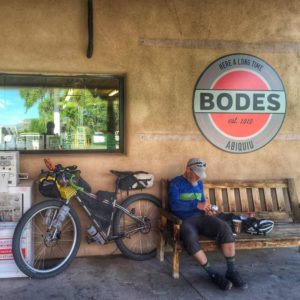 Powered by double espresso, Bachman would think nothing of biking over 200 miles from their house in Frisco to visit a friend in Montrose. Rain or snow, he rode his bike to work every day.
Powered by double espresso, Bachman would think nothing of biking over 200 miles from their house in Frisco to visit a friend in Montrose. Rain or snow, he rode his bike to work every day.
The mathematically-inclined Bachman’s bedtime reading included complicated technical manuals, thick geometry texts, or as his wife jokingly called them, “bicycle math problems.”
Analytical and even-keeled, he enjoyed modifying items to improve efficiency (i.e. removing zippers from bags and gear when he went bikepacking), and his garage was filled with projects, wheel sets, modified bikes, and a recently converted adventure van (his first new car).
“He saved everything and could fix anything. During the pandemic supply shortage, I joked that it was because all the spare bike parts were in our garage,” said Miller.
For 20 years, Bachman logged all his activities, thoughts, and feelings in a journal that his wife gifted him with each Christmas.
Filled with meticulous notes in his impeccable handwriting (aka “Greg Font”), his training book was a diary of his past, present, and future rides. In each journal, he wrote about how he felt, what he did, time, his goals, who he was with, and where. 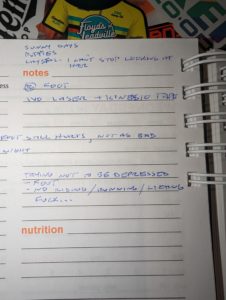

After his death, Miller opened some of Bachman’s journals and discovered notes on how much he loved his wife and enjoyed seeing her.
Even after 20 plus years together, his journals revealed that the couple was still very much in love.
Miller and Bachman shared a unique synergy where they traded off encouraging and supporting the other in their athletic pursuits. Often during events, the couple would check in on each other, make sure they were still moving, etc. Together, they rode century rides including the Triple Bypass and Elephant Rock.
UNBOUND Gravel 2022 was just another event for the adventurous couple to share. Miller had been looking forward to being his support and cheering Bachman on after she finished her 100 mile ride at UNBOUND Gravel. Undoubtedly, at the finish, Miller would have had chips, salsa and beer ready- Bachman’s favorite post-ride ritual.
“I’m so lost without him. He was an amazing human being. And to think that driver just got to take it away. The teacher that was lost. The husband that was lost. The human being. It’s hard. The loss is just huge,” said a devastated Miller.
A teacher who counseled students, and fixed bikes for community members, Bachman was well known within the community for his wisdom.
Following his death, a GoFund Me that was created raised $8,479- exceeding the $5,000 goal; a reflection of how highly regarded he was in Summit County.
To honor Bachman’s memory, Life Time will retire Bachman’s number for the 2023 Leadville Challenge events and has created a never-before TEAM challenge where each of six events will be done by friends of the couple.
In addition, Leadville 100 MTB founders Merilee Maupin and Ken Chlouber have established an ongoing legacy scholarship at the local high school in Leadville.
Although her grief will never disappear, Miller is grateful for the community’s support.
“Greg was such an incredible person. If he made a connection with you, it never went away. For the community who knew us to share their caring and concern and find ways to honor him it is something that I appreciate a lot,” she finished.
their caring and concern and find ways to honor him it is something that I appreciate a lot,” she finished.

Cycling Season is here, and so is a long list of epic rides throughout the state and surrounding states. Are you ready? Join Avid Cyclist, and other co-hosts for the
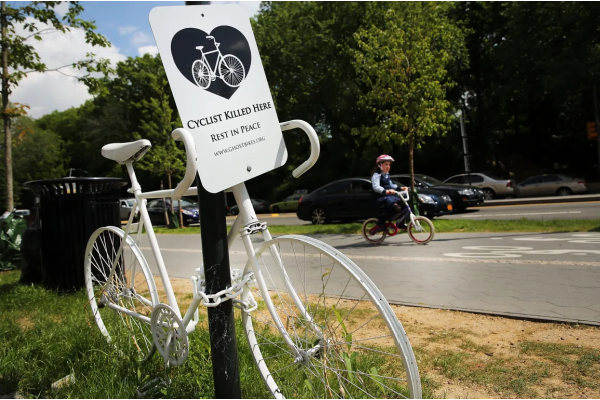
By: Brad Tucker I have been practicing law for over thirty-five years, the majority of which has included representing bicyclists who have been hit by drivers who disregarded the safety

April 8, 2025 Propelled by the powerful stories of victim families, SB25-281 includes new mandatory chemical testing clause BOULDER, CO /ENDURANCE SPORTSWIRE/ – The White Line, founded in memory of 17-year-old
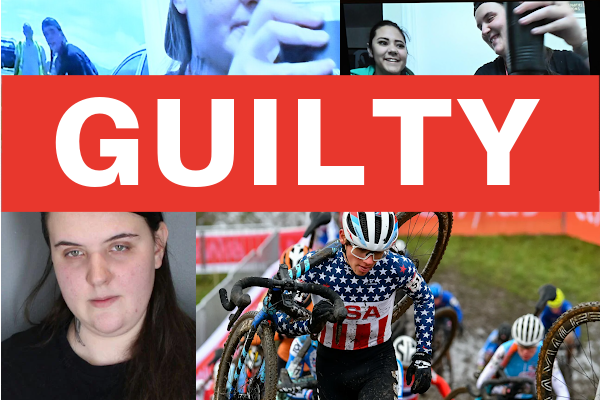
Boulder, Colorado- After a week long trial, late Friday evening, a Boulder County jury found Yeva Smilianska guilty of Vehicular Homicide-Reckless Driving in the death of Magnus White. The jury,
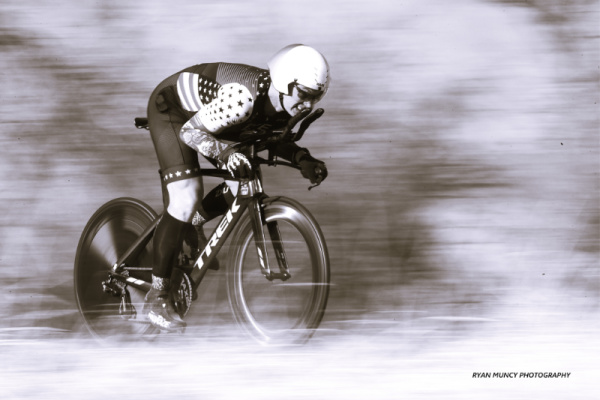
The 2025 Karen Hornbostel Memorial Time Trial Series p/b Cobras Cycling Team has entered its second week! Ryan Muncy of Ryan Muncy Photography was there to capture images of a chilly afternoon. Make
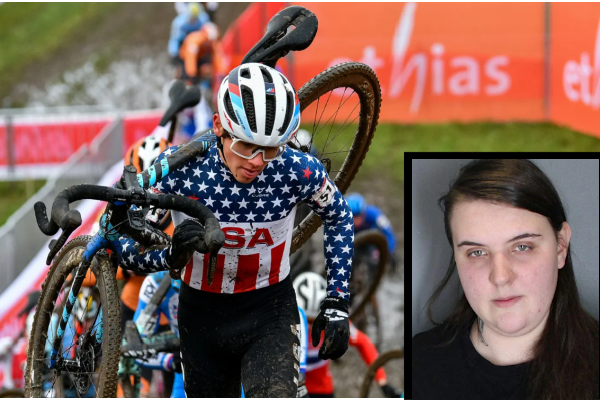
By: Gary Robinson, Avid Cyclist Jury selection began Monday morning for the suspect driver accused of striking and killing Colorado teen cyclist Magnus White near his home in Boulder. Yeva